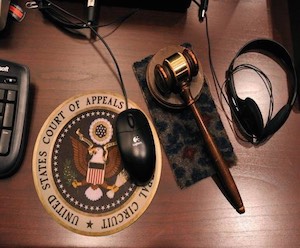 Howmedica Osteonics Corp. v. Zimmer, Inc., (Fed. Cir. May 12, 2016) (Before O’Malley, Plager, and Wallach, J.) (Opinion for the court, Plager, J.) Click Here for a copy of the opinion.
Howmedica Osteonics Corp. v. Zimmer, Inc., (Fed. Cir. May 12, 2016) (Before O’Malley, Plager, and Wallach, J.) (Opinion for the court, Plager, J.) Click Here for a copy of the opinion.
In a case relating to socket assemblies for prosthetic hip implants, Howmedica Osteonics Corp. and Stryker Ireland Ltd. (“Stryker”) appealed from a district court ruling of non-infringement. This conclusion was based on a claim construction ruling, and the court’s decision to not allow an infringement argument under the doctrine of equivalents (“DOE”).
The Federal Circuit found that the specification explicitly supported the district court’s claim construction, which precluded a finding of infringement. Two passages specified the meaning of, and provided context for, a claim term that referred to the relative location among certain claim elements. A “relative location” claim term is often read in light of, and by relying on, the written description. Because the district court’s claim construction was proper, the Court found the grant of summary judgment of non infringement was proper.
The Federal Circuit also found that the district court did not abuse its discretion by refusing to allow Stryker to assert infringement under a DOE theory. Stryker’s infringement contentions (i) failed to assert a DOE theory, except for a generic reservation of rights, and (ii) never sought to amend to include a DOE theory. The Court further relied upon New Jersey’s Local Patent Rules, which particularly provide a procedure for seeking leave to amend contentions following a Markman ruling, which Stryker did not follow. Thus, the Court found no abuse of discretion with respect to the district court’s denial of Stryker’s request to assert a DOE theory of infringement, and affirmed the ruling below.
[Troutman-Ad]
[Troutman-About]

![[IPWatchdog Logo]](https://ipwatchdog.com/wp-content/themes/IPWatchdog%20-%202023/assets/images/temp/logo-small@2x.png)


![[Advertisement]](https://ipwatchdog.com/wp-content/uploads/2024/04/Artificial-Intelligence-2024-REPLAY-sidebar-700x500-corrected.jpg)
![[Advertisement]](https://ipwatchdog.com/wp-content/uploads/2024/04/UnitedLex-May-2-2024-sidebar-700x500-1.jpg)
![[Advertisement]](https://ipwatchdog.com/wp-content/uploads/2024/04/Patent-Litigation-Masters-2024-sidebar-700x500-1.jpg)

![[Advertisement]](https://ipwatchdog.com/wp-content/uploads/2021/12/WEBINAR-336-x-280-px.png)
![[Advertisement]](https://ipwatchdog.com/wp-content/uploads/2021/12/2021-Patent-Practice-on-Demand-recorded-Feb-2021-336-x-280.jpg)
![[Advertisement]](https://ipwatchdog.com/wp-content/uploads/2021/12/Ad-4-The-Invent-Patent-System™.png)






Join the Discussion
No comments yet.